金城新村與金門的關係密不可分,胡璉將軍如何帶領金門成為反攻第一線,將官們在金門前線如何執行任務,眷村的母親如何拉拔子女成長,眷村的孩子如何度過童年時光。本展覽共採集15場金城新村、周邊眷村、金門戰地及眷村改建相關的口述歷史,娓娓道來當年眷村的生命故事。
Listen! The Voice of Military Dependents’ Villages
Jincheng New Village is inextricably linked to Kinmen. How did General Hu Lien launch the counterattack in front-line Kinmen? How did the senior officers perform their missions in Kinmen? How did the mothers in the military dependents’ village raise their children? How did the children spend their childhood there? Featuring 15 pieces of oral history concerning Jincheng New Village, other military dependents’ villages in the surroundings, the battlefield in Kinmen, and the reconstruction of military dependents’ villages, this exhibition narrates the life stories of the figures there during that time.
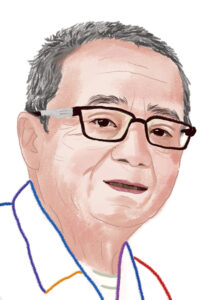
顏學森 金城新村第二代
「薪水都是月初郵差送現金袋到家裡面,我爸爸是上校,一個月薪水三千塊, 一百元三十張當場要數。媽媽月初領了薪水,晚上就會帶我們坐三輪車到新竹去看電影。」
Yan Xue-Sen: The second generation from Jincheng New Village
“My father was a colonel on a monthly salary of NT$3,000. At the beginning of every month, the postman would deliver my father’s salary to my home in a cash envelope with 30 pieces of NT$100 banknotes, and my mother had to check the amount in person. On the day she received the money, she would take us to a movie in downtown Hsinchu by tricycle in the evening.”
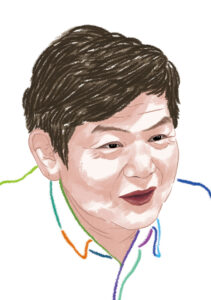
邱漢奇 日新新村第二代
「每天從眼睛睜開來就開始有工作了,都有排值日生啊,負責掃地、倒垃圾、洗碗,家庭的所有工作都分配好啦!沒做看值日表就知道,就要被修理了!開什麼玩笑,誰敢不做。」
Chiu Han-Qi: The second generation from Ri-Xin New Village
“No sooner did I wake up in the morning, than I had to do my chores. We had a duty roster at home, such as sweeping the floor, taking out the garbage, and washing the dishes. All the housework was assigned. Our names were listed on the roster. Those who failed to complete their assignments would be punished! For real, who dared not to follow the roster?”
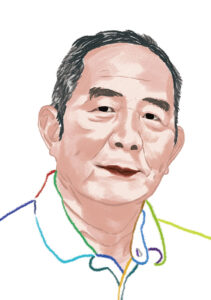
李博駿 南精忠新村第二代
「光復路最有名的就是拔甘蔗。那時候鞋子都是背在身上,打赤腳去玩水,反正建功國小周遭都是田。走路上學時有大馬路我們不走,非要走田埂,抓青蛙看蝌蚪都好玩。」
Li Bo-Jun: The second generation from Nanjingzhong New Village
“The most famous activity on Guangfu Road was harvesting sugarcane. We carried our shoes on the back and played barefoot in the water. Since Jiangong Elementary School was surrounded by sugarcane fields, we walked to school along the footpaths between the fields instead of roads. It was fun whether to catch frogs or to observe tadpoles.”
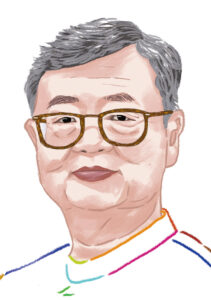
胡敏越 金防部司令胡璉將軍之孫
「軍人給人感覺就是很嚴肅的,但胡璉將軍對孫子卻非常和藹。他很注重禮貌和家庭教育,對人、對國家都是盡心盡力,是我們非常好的榜樣。」
Hu Min-Yue: Grandson of KDC commanding officer General Hu Lien
“Soldiers tend to give people the impression of being serious. However, General Hu Lien was very kind to his grandchildren. He set great store by politeness and upbringing. He was a very genuine person who dedicated himself to the country, an excellent role model for us.”
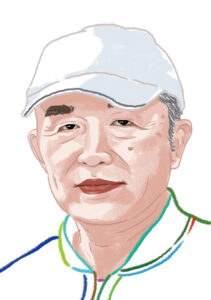
桂天 胡璉故居紀念館館長
「胡璉將軍底下的將官在前線衝鋒陷陣, 為了沒有後顧之憂,在後方也要解決他們的生活問題,陸陸續續地興建很多的眷村,這也是金城新村的由來。」
Gui Tian: Director of Hu Lien Former Residence Memorial
“The officers fought on the front line under the leadership of General Hu Lien. To dismiss their family worries and settle their day-to-day problems on the home front, many military dependent’s villages were built successively, which is also the origin of Jincheng New Village.”
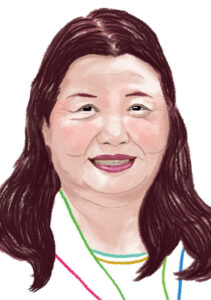
胡蕙霞 胡璉故居紀念館監事
「不管是胡璉將軍也好,各位金城新村的先烈也好,我們都要記住他們為國家所付出的努力以及堅持,繼續往和平的方向邁進。」
Hu Hui-Xia: Supervisor of Hu Lien Former Residence Memorial
“Be it General Hu Lien or the martyrs living in Jincheng New Village, we must remember their perseverance and contributions to the country, and keep fighting for the cause of promoting peace.”
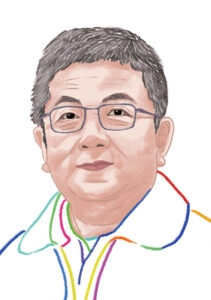
劉寶麟 新竹眷村改建執行者
「推行眷改時我只是一個小上尉,金城新村都是現役或退役的將官,所以講話都充滿威嚴,在溝通的過程中花了一些努力,配合的眷村幹部協助才有現在的華夏金城。」
Liu Bao-Lin: Administer of the reconstruction of military dependents’ villages in Hsinchu City
“I was just a captain when the government was promoting the reconstruction of military dependents’ villages. At that time, the residents in Jincheng New Village were either active or retired generals who spoke in a dignified, imposing manner. It took me considerable effort to communicate with them. Huaxia Jincheng would not be built without the help of the cadres in the military dependents’ village.”
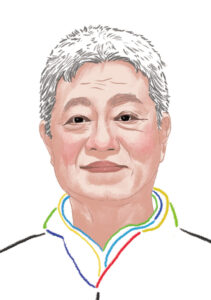
廖志強 金城新村二代
「爸爸那時是擔任心戰大隊的大隊長,所以洗照片、拍照都是他們重要的工作……。家裡還有這個葡萄架,每年夏天葡萄長了整串,可以釀葡萄酒,小時候的生活是很精彩的。」
Liao Zhi-Qiang: The second generation from Jincheng New Village
“My father was the then commanding officer of Psychological Operations Group. Taking and developing photos were part of their important tasks… We erected a grapevine trellis at home from which we harvested bunches of grapes every summer for wine making. I had a pretty wonderful childhood.”
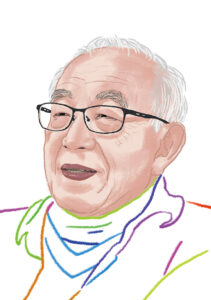
王振亞 北赤土崎新村二代
「每年都會做眷村菜,我也有做眷村電鍋大餅,電鍋裡面放一點油,發麵之後放下去,熱度到它就會跳掉。有人做餛飩啊,做水餃啊,大家就這樣子互相學。」
Wang Zhen-Ya: The second generation from Beichituqi New Village
“We cooked military dependents’ village dishes every year, and I made flat bread using an electric cooker. After the dough rose, I drizzled a little oil over the electric cooker and placed the dough into it. The electric cooker would heat the dough to a certain temperature. Some people made wontons and others dumplings. We learned to cook different dishes from one another.”
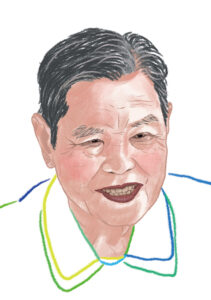
曹啟龍 金城新村二代
「砲彈一打,受傷的、打死的都有,也會打到老百姓房子,挖了防空洞就好多了……。那個時候金門有個醫院,不過那個醫院很小,躲砲彈只能靠自己。」
Cao Qi-Long—The second generation from Jincheng New Village
“When the artillery shells fell, people might be wounded and even killed. Civilian houses might be destroyed as well. The situation got better after we had air-raid shelters… There was a hospital in Kinmen, but it was very small. We could only count on ourselves to avoid being hit by the artillery shells.”
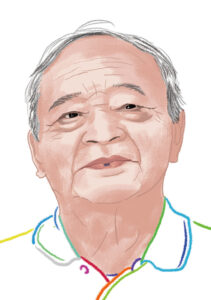
何江海 貿易二村遷入金城新村
「民國66年結婚,結婚的第三天就跟部隊到馬祖,金門馬祖各待了六年。 太太結婚後就開始做手工藝的代工,直到我升少校還在幫人家帶小孩,那時候很辛苦的。」
He Jiang-Hai: Moving from Maushang II Village to Jincheng New Village
“In 1977, just three days after I got married, I was deployed to Matsu with the troops and stationed in Matsu and Kinmen for six years respectively. My wife became a subcontract worker for handicraft making at home, and she continued to do babysitting even though I was promoted to the rank of major. It was quite a time of hardship.”
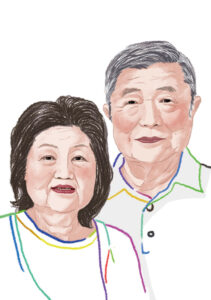
張蘭澄、梅淑慧 金城新村二代
「我婆婆(張母)是四川重慶人,先生也很喜歡吃辣,乾拌麵整碗都是紅油。我公公是河北人,所以我們家也吃麵食,以前都自己和麵自己做,然後做包子、做饅頭,甚至做麵條。」
Zhang Lan-Cheng / Mei Shu-Hui: The second generation from Jincheng New Village
“My mother-in-law (Zhang’s mother) is a native of Chongqing, Sichuan Province. My husband loves spicy food as well. The bowl of his dry noodles tends to be covered with spicy oil. Since my father-in-law is a native of Hebei Province, we also eat food made from wheat flour. We make doughs by ourselves for baos, steamed buns, and even noodles.”
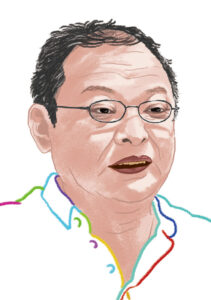
宋樹人 金城新村二代
「診療所就像現在的小診所一樣,主要看生病感冒、胃痛這種的。以前診療所沒有那麼普遍啊,以那個年代來講,它是收費比較低廉,一般老百姓承受得了的地方。」
Song Shu-Ren: The second generation from Jincheng New Village
“The walk-in clinic was little more than today’s local clinics. It mainly treated minor illnesses such as colds and stomachaches. Clinics were not common in the past. At that time, the walk-in clinic was a place where the charges were relatively low and affordable to ordinary people.”
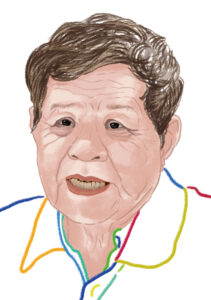
劉雲海 忠貞遷入金城新村
「那個時代老師講話都用臺語在教,有一些退伍的老先生教國語也聽不懂,鄉音太重。後來慢慢才有一些師範的年輕老師出來教標準國語,才聽得懂,比較正確啦。」
Liu Yun-Hai: Moving from Zhongzhen New Village to Jincheng New Village
“At that time, teachers mainly taught courses in Taiwanese. Some veterans who taught us Mandarin, but I hardly understood what they taught owing to their heavy accents. It was not until later when young teachers graduating from normal schools started to teach us standard Mandarin that I could understand it better.”
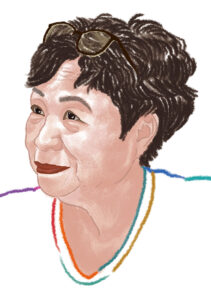
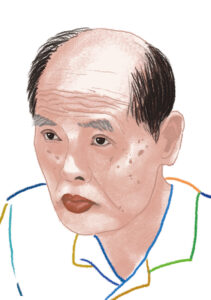
牛慶玲、陳聰明 竹人托兒所園長
「我們學校的舞龍舞獅和鼓隊都很有名,小朋友那麼小,背著那麼大的鼓,真棒!……我應該是屬於嚴厲派,從小樹苗你沒有把他導正,等它長大定型可能就來不及了。」
Niu Qing-Ling / Chen Cong-Ming: Heads of Zhu-Ren Preschool
“Our preschool was known for its troupes of drum performance, dragon dance, and lion dance. Being able to carry such big drums, these little kids were really awesome!… I was supposed to be a strict teacher. For me, kids resemble saplings. It will be too late to correct them after they have grown up and their personalities have taken shape.”
